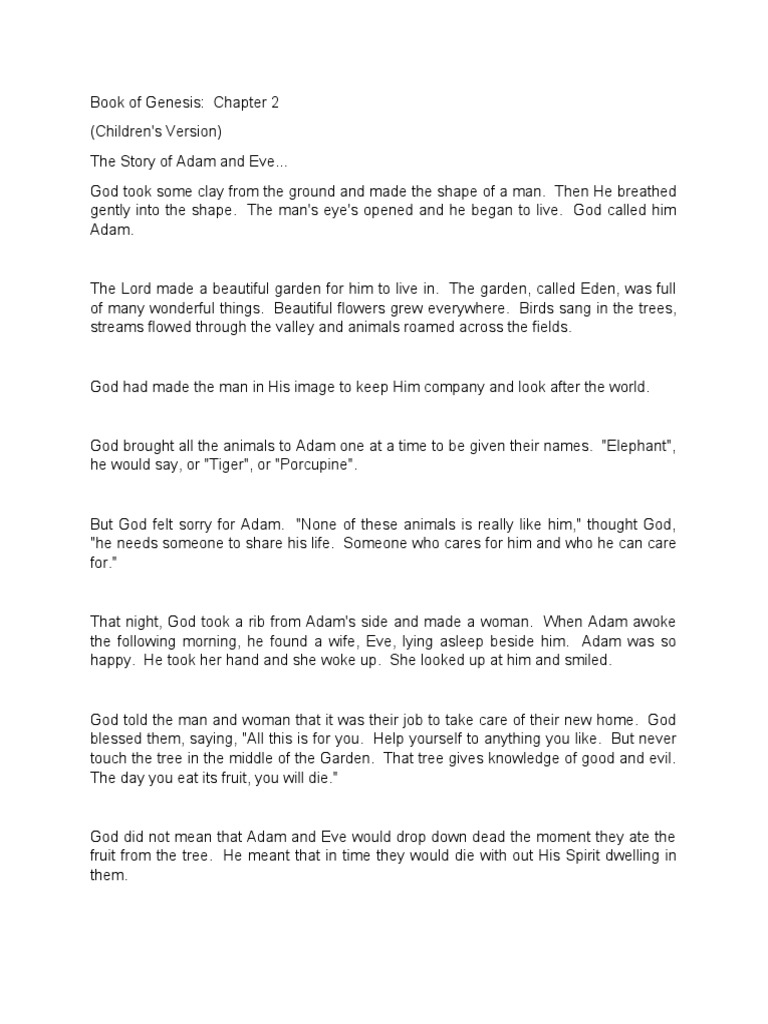The story of Adam and Eve has long been a cornerstone narrative within various religious traditions, captivating scholars, theologians, and laypersons alike. Despite its ancient roots, the tale continues to evoke profound intrigue and varying interpretations, prompting a reevaluation of its implications in modern spiritual discourse. In the framework of Bahá’í teachings, which advocate for a progressive understanding of scripture and a lens of unity, rethinking the story of Adam and Eve invites a rich exploration of its allegorical significance rather than a literal understanding. This examination serves as a means of fostering a deeper, inclusive synthesis of spiritual insights to meet contemporary existential inquiries.
At the heart of the Bahá’í faith is the belief in progressive revelation—an idea that divine guidance unfolds over time through various prophets. In this schema, the story of Adam and Eve transcends its historical context, emerging as a profound allegory illuminating the transformative journey of the soul. This recontextualization beckons us to view the narrative not merely as a recounting of the origins of humanity but rather as an exploration of the evolution of human consciousness.
To begin this exploration, one must grapple with the theological implications of the figures of Adam and Eve. In traditional interpretations, Adam is perceived as the progenitor of humanity, embodying notions of divine creation and fundamental human nature. Simultaneously, Eve represents companionship, nurturing, and the dualistic balance of the masculine and feminine principles. However, reflecting upon these archetypes through a Bahá’í lens compels us to emphasize their symbolic rather than literal existence—envisioning them as archetypal representations of humanity’s innate traits and potentialities.
The Garden of Eden serves as a crucial backdrop in this narrative—the lush sanctuary where Adam and Eve dwell, only to be expelled following their fateful consumption of the forbidden fruit. Some interpretations posit that the Garden symbolizes an initial state of spiritual purity and oneness with the divine. The act of eating from the tree of knowledge becomes a pivotal moment of self-awareness and moral agency, suggesting that the quest for knowledge and understanding is intrinsic to the human experience. In this sense, the expulsion from Eden can be reinterpreted as humanity’s evolution into a realm of greater spiritual maturity, requiring the development of ethical discernment and the capacity for choice.
This notion underscores a defining characteristic of human existence: the tension between instinct and intellect, or the dualities of desire and restraint. Indeed, the Bahá’í perspective affirms that ascension towards greater truth invariably demands a process of self-reflection and struggle against base instincts. Thus, the narrative of Adam and Eve exemplifies the transformative journey of each individual soul as it grapples with the complexities of moral choices and spiritual development.
Furthermore, examining Adam and Eve’s story through the prism of interconnectivity fosters a profound sense of community. Within Bahá’í teachings, the concept of oneness—both of humanity and of creation—serves as a guiding principle. By reframing the narrative as a shared experience rather than a singular incident, one can embrace its collective dimensions. The story can be seen as a reminder that every individual is part of a broader tapestry of existence, urging us toward mutual collaboration in the pursuit of truth and moral evolution.
The symbolism of the forbidden fruit—a representation of knowledge and enlightenment—invites us to ponder the implications of intellectual exploration and the potential perils associated with it. It suggests that enlightenment often comes with trials, a journey that may lead to disillusionment or estrangement from previous certainties. Bahá’í philosophy champions the idea that knowledge, when pursued with humility and sincerity, can yield progress and a deeper understanding of the interconnectedness of all life.
In examining the consequences of Eve’s decision to partake in the fruit, a critique of gender roles becomes apparent. Traditional interpretations have often marginalized Eve in their portrayal, positioning her as the source of humanity’s fall from grace. However, a Bahá’í re-evaluation seeks to elevate the feminine aspect, recognizing that the qualities embodied by Eve are as essential to spiritual growth as those represented by Adam. The narrative, when scrutinized critically, implores us to transcend gender-based dichotomies and to acknowledge the importance of unity and equality in spiritual pursuits.
Moreover, the enmity and discord that arose post-expulsion can be seen as emblematic of humanity’s tumultuous journey toward spiritual awakening. The deep-rooted rivalries among people, nations, and beliefs reflect our collective struggle in reconciling diverse perspectives while aspiring to universal truths. Bahá’í teachings advocate for the elimination of prejudice, urging us to see beyond surface differences and to appreciate the rich mosaic of human experience as a catalyst for profound spiritual enrichment.
Ultimately, rethinking the story of Adam and Eve through the lens of Bahá’í teachings not only enriches our understanding but creates an opportunity for personal and collective transformation. This approach encourages a move away from simplistic narrative assessments towards an embrace of dynamic spiritual exploration. It fosters a recognition that the essence of the story resonates deeply with contemporary quests for meaning and understanding amid ever-evolving societal landscapes.
In conclusion, re-examining the story of Adam and Eve invites a deeper understanding that transcends mere allegory. It emphasizes the journey of the human spirit, the importance of moral agency, and the significant role of knowledge. As humanity continues to grapple with ethical dilemmas and existential questions, the wisdom embedded in this ancient narrative offers profound insights that remain relevant to our ongoing quest for unity, understanding, and spiritual elevation.
